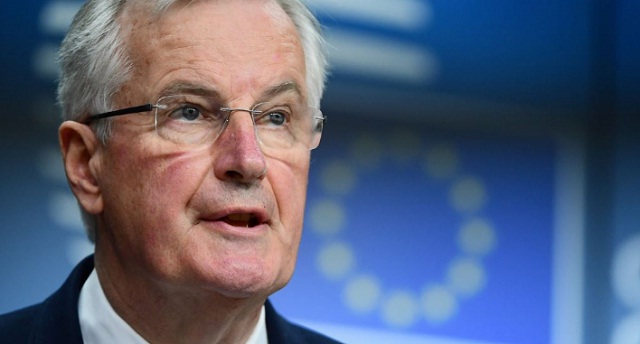
Brussels, Belgium | AFP | The EU warned Britain on Thursday that time is running out to reach a divorce deal by the end of the month, a necessary step to guarantee moving the Brexit process on to trade negotiations.
As Brexit talks resumed in Brussels, concerns are growing among EU officials that British Prime Minister Theresa May’s mounting political woes are slowing down negotiations on the historic split.
Stalling by Britain on its exit bill has prompted fears that EU leaders will be unable to advance to the next phase of talks on a trade deal as hoped in December, and that the deadline could even slip to March.
“Time is pressing,” chief EU negotiator Michel Barnier said in a speech in Rome before flying back to Brussels to start the sixth round of the slow-moving talks.
“The European Council summit in October wanted to keep up the dynamic of the negotiations and I am of the same state of mind,” he said. “But the real moment of clarification is coming.”
Barnier added that future ties would depend on whether Britain stuck to the “European model” of regulation, in a pointed warning after US Trade Secretary Wilbur Ross said London should move closer to US rules after Brexit.
Britain’s Brexit ministry replied on Twitter that “we’ve made considerable progress on the issues that matter.”
– ‘A bit concerned’ –
This week’s talks feature a stripped-down two-day schedule instead of the normal four days, with Barnier and his British counterpart David Davis set to meet only on Friday morning before holding a press conference, sources said.
To move on to talks on a free trade deal and a post-Brexit transition period, the EU is demanding sufficient progress on three key divorce issues.
The most contentious is the bill Britain must pay to cover its budgetary commitments, a figure which senior European officials put at 60 billion euros ($70 billion).
They also want commitments on keeping an open border between Northern Ireland and Ireland, and on guaranteeing the rights of three million European citizens living in Britain.
But the British government looks increasingly distracted, with the resignation of its aid minister over meetings in Israel on Wednesday adding to the sense of chaos since May’s disastrous showing in elections earlier this year.
Britain also faces an economic slowdown, with the EU cutting its growth outlook for the country this year and warning that times would remain tough to 2019 as “uncertainty” over Brexit weighs heavily.
“We are a bit concerned about what we are seeing in the UK at the moment, we want a strong negotiating partner,” an EU diplomat told AFP on condition of anonymity.
“I see a strong willingness to come to a deal. I am confident that everybody understands what has to be done on both sides. The question is, Do they have the strength? And will the moves be made in time by the end of November, first week of December?”
– ‘Major issues’ –
That timescale would allow preparations for a formal decision by EU leaders at a summit on December 14-15 to move on to discussing future ties, a step Britain has been pushing for for months.
“Everything is ready (to start trade talks) on the first of January,” the EU diplomat said.
Failure to do so would probably push back the move to one of the next summits in February or March, leaving only around six months to reach a deal by October 2018, the timeline Barnier has set for the withdrawal agreement to be ratified by Brexit day in March 2019.
The latest round is the first since EU leaders agreed at an October 20 summit to start internal work on a trade deal, while also warning that Britain had made insufficient progress on the divorce to start formal discussions.
The EU says Britain must provide written guarantees of a pledge to honour the financial commitments that May made in a speech in Florence, Italy, in September.
“We don’t need speeches, we need commitments,” the diplomat said.
The European Parliament — which will have the final vote on any Brexit deal — meanwhile rejected fresh proposals by Britain on citizens’ rights, saying “major issues” remain.
 The Independent Uganda: You get the Truth we Pay the Price
The Independent Uganda: You get the Truth we Pay the Price





